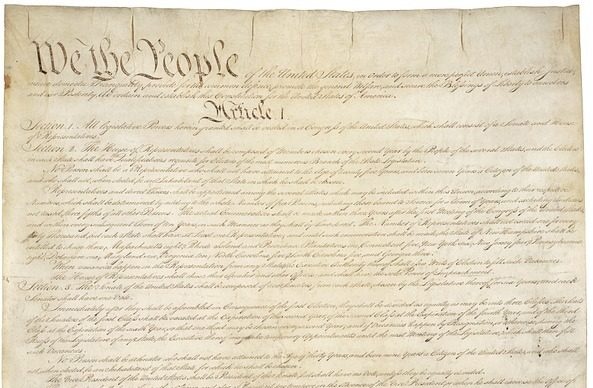Of the 10 Amendments within the Bill of Rights, the 9th Amendment stands out as the constitutional addition that allows the people of the United States to exercise the rights expressly listed in the Constitution, as well as an account for other rights that may not be specifically stated known as unenumerated rights.
Originally, there was no Bill of Rights created by delegates during the Constitutional Convention. Many state constitutions had their own, but the national government had yet to implement one.
“There were complaints about the proposed constitution, and the opposers were mostly concerned about how it shifted government power away from the states and gave it to the centralized national government,” Stephen Feldman, adjunct professor of political science, said. “They realized that the lack of a Bill of Rights in the proposed document was a problem that would have political traction.”
Feldman continued to explain that Alexander Hamilton wrote an essay on why the U.S. had no need for a bill of rights. If Congress was not given the power to implement restrictions on certain natural rights, then there would be no reason to protect those rights.
“If we had a bill of rights, it would likely undermine the rights of the people because once we had an express list of rights in the Bill of Rights, someone inevitably would come along and say that ‘If it’s not in the express list, then we don’t have it,’” Feldman said.
Feldman said James Madison eventually conceded and told the Constitutional Convention attendees that he would add a bill of rights to the Constitution as soon as the Constitution was ratified and put into effect. This is how the original 10 Amendments became part of the U.S. political canon.
“The 9th Amendment says that just because it’s not in the list doesn’t mean the people don’t have the rights,” Feldman said. “That might be debated, however, seeing that as a practical matter, the 9th Amendment has had very little impact on Constitutional law.”
The 9th Amendment states, “The enumeration of the constitution of certain rights shall not be construed to deny or disparage others retained by the people.”
In settings involving the court system, justices have been hesitant to invoke the use of the 9th Amendment. With the case Griswold v. Connecticut, this amendment was used to account for the American citizen’s right to privacy, which is not expressly listed but is what Feldman refers to as an ‘implied right.’
“We can debate forever what those implied rights might be, but [the 9th Amendment] has a textual basis for asserting that there are implied rights, even if we don’t know what they are,” said Feldman.
Within modern contexts, History Professor Renee Laegreid views the 9th Amendment as the protection of unenumerated rights from both state and federal discrimination.
“When the founders wrote the Constitution, they weren’t magicians or seers,” Laegreid said. “They had no idea what was going to come up.”
Laegreid said that even President Thomas Jefferson, author of the Declaration of Independence, recognized the need for the Constitution to be a document requiring adjustments over time.
“It has to be adaptable, and the 9th Amendment was a way of adjusting to things that come up over time that they can’t anticipate,” said Laegreid.
Cases that have involved the 9th Amendment and its implications have been few and far between due to the broad context in which an unenumerated right may be found, but it remains within the original 10 Amendments of the Bill of Rights that is integral to Constitutional law.
“It’s a CYA – cover your ass,” Laegreid said. “Because they can’t think of everything, they know that there are things going to be coming up and in order to protect individual rights and liberties, they had to be able to say that ‘Whatever we can’t think of now won’t mean that only these things we covered are important.’”
The 9th Amendment, along with its counterparts within the Bill of Rights, serves to protect the rights of American citizens. What set the 9th Amendment apart is its power to fill in the gaps that simply could not and cannot be accounted for within the law.



